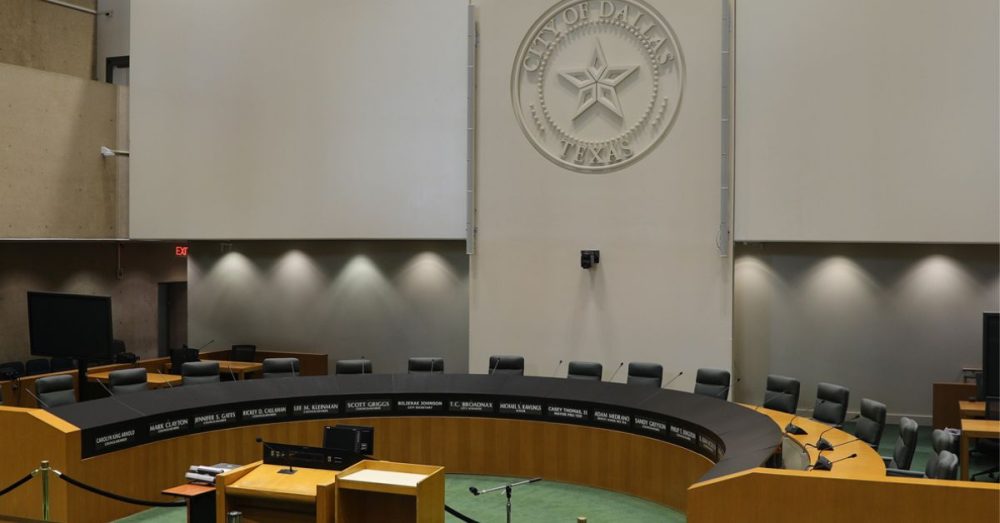Credit rater Moody’s Investor Service appears to have concerns about how the City of Dallas handles its money.
The City of Dallas’ General Obligation outlook has fallen from “stable to negative,” a memo from Interim City Manager Kim Tolbert recently announced.
Both the press and the summary provided by Tolbert have portrayed this as a consequence of voters choosing to pass Proposition U in the November General Election. Proposition U is a charter amendment that requires the city to hire around 900 more policemen to hit a threshold of 4,000.
However, while the Moody’s report does cite Proposition U, it is not the only concern raised by the financial institution.
Writing to the city council, Tolbert said, “The report … notes that ‘the negative outlook reflects the expected credit impact of Proposition U.’ Further, ‘going forward, the city will face budget challenges given required increases to its pension plans, growing public safety expenses, and reduced financial flexibility following voter approval of Proposition U.'”
While the Interim City Manager does briefly note that Moody’s found issue with more than just Prop U, both Tolbert and local outlets such as KERA have reported the story the same way, attributing most of the blame to the charter amendment.
However, upon further examination of Moody’s report, one observes that many of the issues the financial institution cites pre-date the amendment’s passage.
After mentioning Prop U and the increase in pension expenses from hiring new policemen, the report says the negative outlook also reflects “the pension plans’ very weak cash flow and the already substantial unfunded liability that is not expected to materially decline for several years despite additional contributions.”
The City of Dallas has had persistent pension funding issues for years. The San Antonio Express ran a headline in 2016 with the wording, “The Dallas pension nightmare,” describing the myriad financial issues in the pension.
The City fire and police pension had $3.5 billion in unfunded liabilities in 2023, The Dallas Express previously reported.
Earlier this year the City passed a plan to give an annual 1% stipend for first responder retirees on the pension fund. This action outraged Jaime Castro, the president of the Dallas Police Association, at the time.
“I’m disgusted and angry beyond belief to hear what the City pension plan proposal will be,” he said, per KERA News.
“I cannot, in good conscience, advocate for this department if this plan passes,” he continued. “The message will be clear: If you don’t need a raise in 22 years after you retire, in today’s economy, the city of Dallas is for you.”
There are more issues than pensions for the city, Moody’s report said.
Office vacancies have increased in the City. This can hurt cities because it decreases property taxes and other forms of revenue that can help support municipal budgets. CBS News reports that this can ripple across the economy and hurt a variety of industries because many buildings are financed through short-term loans, and if real office landlords cannot make money from commercial tenants, they could default on their loans, impacting lenders, such as banks, and increasing their risk.
Since work-from-home took hold during the COVID-19 pandemic, this has been a widely reported issue in many major American cities. However, Moody’s clarified that the Dallas office vacancy rate has “increased but not as much as most other large cities,” but this was not intended to dispel the seriousness of the situation. An adjacent chart indicates that Dallas has an office vacancy rate of close to 25%, which puts it at one of the highest levels in the nation.
Moody’s says that, for the time being, this has been offset by “new construction in other sectors and strong appreciation of existing properties,” although the document does not forecast how long this is expected to last.
If the city’s credit were to be downgraded, it could increase the interest rate on municipal debt, creating a greater expense for Dallas.
Notably, no action has been taken to substantively downgrade Dallas’s credit rating, at this time.
“The revised credit outlook is not a rating downgrade, it is an indication of an expected direction of the credit rating’s movement to be reviewed over the next 18-24 months,” Tolbert said.
She appeared to hint that Proposition U’s enactment was also uncertain.
In the next line, she wrote, “As a reminder, City Charter amendments do not take effect until after the City Council by resolution enters an order declaring that the amendments have been adopted. City Council is scheduled to meet on Tuesday, November 19, 2024, to accept the canvassing report and approve the resolution.”
Presumably, this would also apply to Proposition S, an amendment passed at the same time that removed the city’s immunity from lawsuits for violating its charter. These amendments were part of a trio, commonly referred to as “S, T & U” or “the HERO Amendments.”
Proposition T narrowly failed to pass by around 3,000 votes while S and U got the approval of 55% and 51% of the voters.


